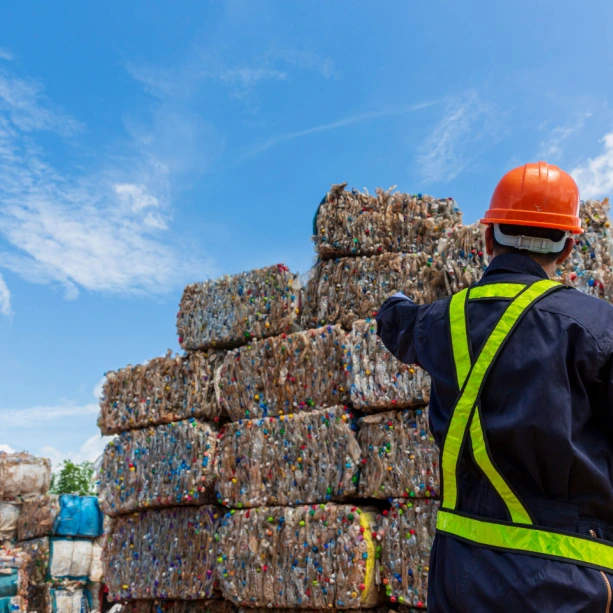Waste management is an essential aspect of any business. From saving money to ensuring safety, the benefits of properly managing waste outweigh the cost. Traditionally, waste tracking was done manually, which was a time-consuming and laborious task. However, with the introduction of technology, waste tracking has become more streamlined, efficient, and effective. Let’s explore how technology is changing waste tracking and the benefits it offers.
Why Waste Tracking is Necessary
Waste tracking is the process of monitoring and managing waste, including the amount of waste generated, collected, and disposed of. Waste management is a crucial component of environmental sustainability, and waste tracking is an integral part of the waste management process. This form of tracking helps businesses monitor and manage their waste, ensuring that it is disposed of in a safe manner or properly reused.
Manufacturing processes often generate a significant amount of waste. Without proper waste tracking, they may inadvertently dispose of waste that could have been reused or recycled, resulting in unnecessary costs and environmental harm. Additionally, tracking waste provides valuable insight into the amount of waste generated, which helps manufacturers identify areas where waste reduction efforts can be implemented. Tracking waste also helps manufacturers ensure compliance with environmental regulations and demonstrate their commitment to sustainability.
Increase Your ROI by Investing in AirFinder OnSite
- Low Cost. AirFinder OnSite XLE is a fraction of the cost of competitors' pricing.
- Long Battery Life. XLE lasts up to 7 years with hundreds of location updates daily.
- Increased Efficiency. Spend less time looking for assets, and more time being productive.
Traditional Waste Tracking Methods
The traditional method of waste tracking involves manual record-keeping, conducted by recording the amount of waste generated, collected, and disposed of in a logbook or spreadsheet.
Manual waste tracking can be prone to errors in data collection and recording, which may result in inaccurate data and impact waste management decisions. Additionally, it can be a time-consuming process, especially for businesses that generate a large amount of waste, and time constraints may not allow for more thorough data analysis and reporting. As the amount of waste generated increases, manual tracking also becomes challenging to scale, and it may be difficult to accurately track and record waste if the volume is too high. Furthermore, real-time data is not an option for manual tracking, as this method typically involves recording data on a periodic basis – such as daily or weekly – which can limit the ability to respond quickly to waste management issues. To ensure accurate and timely data collection, it may be necessary to supplement manual tracking with other methods, such as automated waste monitoring systems.
The Role of Technology in Waste Tracking
Technology has revolutionized waste tracking, making it more efficient and accurate. Asset visibility technology tracks the location and movement of assets, enabling companies to monitor their waste data in real time, identify problems, and implement corrective actions with ease.
A waste tracking system enables companies to improve their operational efficiency, reducing their costs. By incorporating data analytics tools, companies can also identify waste spikes, enabling them to make adjustments if they seem to indicate a production error.
Increased Efficiency
The use of technology in waste tracking enables manufacturing operations to streamline their waste tracking process, reducing the time and resources required to manage waste. When waste tracking is accurate, it allows for manufacturing processes to be optimized for efficiency, producing a higher output.
Improved Accuracy
Waste management technology equips manufacturing operators to improve the accuracy of their waste data. Real-time tracking reduces the chances of errors, and helps provide more accurate data analysis that manufacturers can use to make informed decisions.
Real-time Tracking
Waste management software empowers companies to track their waste data in real time, making it easier to monitor their waste containers and other relevant assets. Real-time tracking enables manufacturing operators to identify problems and implement corrective actions promptly. For example, if a waste container is full, an alert can be sent to the manager, letting them know that it’s time to schedule a pick-up. Waste management tracking also enables manufacturing operations to respond to incidents such as spills or accidents as soon as they happen rather than stumbling across it unexpectedly or having to wait for a report to come in.
Cost Savings
Technology-enabled waste tracking allows manufacturers to reduce their costs by optimizing waste usage. Some types of waste can be utilized in multiple parts of the production process. Reutilization helps the company save money, but without proper tracking of waste, components that can be potentially reused might be overlooked and disposed of. Software for waste management provides visibility of waste to ensure that it is reutilized.
Ensure Compliance
Waste tracking software provides companies with the necessary data to demonstrate compliance with regulations and environmental standards. For waste management, this means that companies can prove that waste is disposed of in a safe and compliant manner. This helps companies avoid fees and other penalties for a lack of compliance by providing accurate reporting to use as proof of compliance.
Future of Waste Tracking
The future of waste tracking is exciting, with new technologies being developed that will revolutionize the waste management industry. The use of Artificial Intelligence (AI), the Internet of Things (IoT), and Big Data analytics is expected to have a significant impact on waste tracking, empowering companies to manage their waste more efficiently and effectively.
AI can help companies predict waste generation and optimize waste management processes. For example, AI can help companies forecast waste generation based on historical data, weather patterns, and other factors. This can equip manufacturing operators to optimize their usage of reusable waste and make adjustments when a spike in waste is predicted to either keep the waste levels down or deal with the greater influx.
From implementing more efficient production processes to utilizing recycling technologies and renewable energy sources, companies are finding innovative solutions to manage their waste more effectively. With the increasing focus on sustainability and environmental responsibility, these technologies will continue to play a crucial role in waste management, helping to create a more sustainable and circular economy.
How Well Are You Tracking Waste?
If you’re still relying on manual processes for tracking waste, then you are still lacking the complete visibility asset tracking provides and risking errors. Asset tracking has proven to be the best solution for manufacturers looking to track their waste. Whether you want to monitor waste spikes, ensure proper disposal of waste, or be more environmentally conscious, you should invest in asset tracking technology.
Link Labs provides an asset tracking solution that manufacturers can use for waste management. Our AirFinder solution provides real-time visibility of waste in a manufacturing plant. This way, manufacturers have accurate reporting and can properly reuse or dispose of their waste, allowing for increased sustainability efforts. For more information about how we can help you track your waste, book a demo with our team!





